When it comes to owning a home, you’ll know all too well how many responsibilities it comes with. From making sure that your home is insulated right down to preventing pests from entering, it can almost feel like a full time job. When it comes to plumbing, there are many things that you need to Read more
Whats New
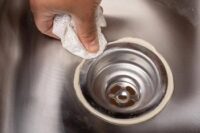
When it comes to owning a home, you’ll know all too well how many responsibilities it comes with. From making sure that your home is insulated right down to preventing pests from entering, it can almost feel like a full time job. When it comes to plumbing, there are many things that you need to keep on top of so that you don’t need to call a plumber. To help you out, we’re sharing our top tips so that you can keep your plumbing in top notch condition.
Know where your shut off valve is
There may be times where you need to shut your water off because of a leak or a burst pipe, so it’s important to know where your shut off valve is. The sooner you can shut off the water, the less damage you risk being done to your home. The shut off valve is usually near your water metre or where your main water line enters your home. Once you know where it is, make sure everyone in your home also knows in case of an emergency.
Watch what you put down the drain
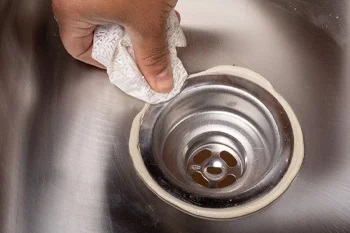 One of the biggest issues we get called out for are clogged pipes, and most of the time it’s because the homeowner wasn’t careful with what they were putting down the drain. Remember that you should never flush anything that’s not biodegradable like wipes or sanitary products. You should also be careful not to wash down any food scraps or oil into your kitchen sink. A great way of avoiding this is by using a drain screen – they’re inexpensive and can save a call out.
One of the biggest issues we get called out for are clogged pipes, and most of the time it’s because the homeowner wasn’t careful with what they were putting down the drain. Remember that you should never flush anything that’s not biodegradable like wipes or sanitary products. You should also be careful not to wash down any food scraps or oil into your kitchen sink. A great way of avoiding this is by using a drain screen – they’re inexpensive and can save a call out.
Sodium hydroxide is your best friend
If your sinks or drains become clogged, a great way of freeing them up is by using sodium hydroxide, otherwise known as caustic soda. It’s a good idea to buy sodium hydroxide in bulk to make sure you always have some on hand. Remember that it is very corrosive, so you’ll need to make sure you wear the right protection and make sure that the sink or drain is thoroughly flushed afterwards, but it is fantastic for breaking down organic matter and clearing a blockage.
Regularly check for leaks
Checking your home regularly for signs of leaks is another top tip because it allows you to get the problem sorted before it turns into a bigger problem. Usually you’ll be able to fix small leaks by yourself with a bit of replacement piping, but remember that if you’re not sure you should always call a plumber.
Keep an eye on your water pressure
Lots of people struggle with their water pressure in the sense that it’s too low, so when they have high water pressure they think it’s a good thing. However, if your water pressure is too high it can cause leaks or even burst the pipe all together. Luckily, you can buy a water pressure gauge which is easy to fit and can prevent unnecessary costs.
Follow these tips and you’ll reduce the need to call out a plumber and be able to fix minor plumbing issues at cost!
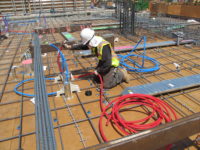
It’s becoming more and more important to do all we can for the planet and to act and work in as eco-friendly a way as possible. In some cases, that can be harder to do than others, or at least harder to come up with ways to do it, but the good news is that Read more
It’s becoming more and more important to do all we can for the planet and to act and work in as eco-friendly a way as possible. In some cases, that can be harder to do than others, or at least harder to come up with ways to do it, but the good news is that if you want to ensure the plumbing work you do or the plumbing around your own home is eco-friendly, there are lots of options. With that in mind, keep reading to find out more.
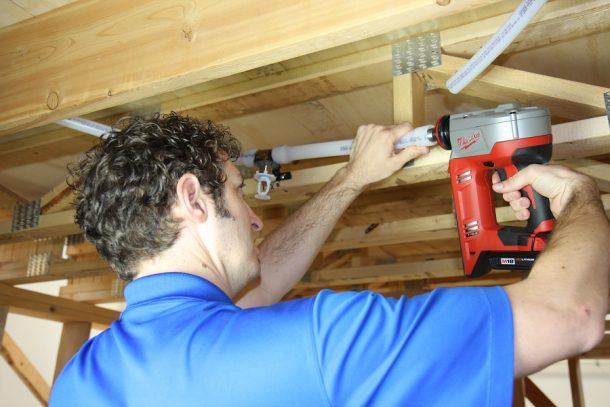
Upgrade To Low-Flow Fixtures
One of the biggest problems when it comes to water and the environment is just how much we tend to waste on a daily basis. Most of the time, we won’t even realize we’re doing it – we’ll leave a tap running for too long, we’ll have a bath rather than a shower, we’ll use our washing machine with just one or two items in it, and so on. It’s not that we’re being intentionally disruptive; it’s just that we don’t think about saving water on a regular basis (possibly because we’re so used to being able to use it whenever we want).
Although the best thing to do is to educate yourself and the rest of your household about how to save water, something that will help in the meantime and, if you do forget in the future, is upgrading to low-flow fixtures. These include taps, toilets, and showers, and they use a lot less water than traditional fixtures. It’s a small change, but it can make a big difference.
Rainwater Harvesting
If you live somewhere that has a lot of rain, why not make use of it? Rather than allow all that precious water to sink into the ground, you can actually have a plumbing system that uses rainwater (in part, at least – there may not be enough to use it exclusively, plus it’s not ideal for drinking water) and saves any wastage (not to mention the fact that you’ll be using less water yourself as a result).
As we’ve said, rainwater can’t be used for everything in your home, but it can be perfect for flushing toilets or keeping your backyard watered, and investing in some rainwater tanks and a new plumbing system to use them could be a great option if you want to be more eco-friendly.
Use Sustainable Materials
If you want or need to upgrade your plumbing system and you also want (and need) to be eco-friendly, make sure you pay attention to the materials you’re using – they need to be sustainable ones because that’s what’s going to make your plumbing system so much better for the environment.
In fact, when you start shopping around, you might even be able to find recycled materials, which is a fantastic option. Otherwise, you can choose things like copper, stainless steel, and PEX, as they’re all great eco-friendly choices as well. Of course, you don’t have to rip everything out and start fresh with sustainable materials right now (that’s actually a waste if there’s no immediate need), but keep the idea in mind for when the time to replace pipes and other elements comes.
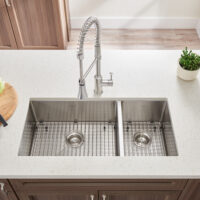
That stainless steel bathrooms are elegant is not in question. We see them in establishments and homes of all kinds, a testament to their wide acceptance. But there’s another side to this material, one that’s equally remarkable. If you value environmental preservation, you’ll be pleased to know that, beyond its beauty and elegance, stainless steel Read more
That stainless steel bathrooms are elegant is not in question. We see them in establishments and homes of all kinds, a testament to their wide acceptance. But there’s another side to this material, one that’s equally remarkable.
If you value environmental preservation, you’ll be pleased to know that, beyond its beauty and elegance, stainless steel is a notable driver of ecofriendliness. Below, we’ll discuss how stainless steel promotes sustainability and how buying stainless steel bathroom sinks contributes to sustainable living.
How Stainless Steel Bathroom Sinks Promote A Sustainable Lifestyle
So, what green reasons do you have to opt for stainless steel bathroom sinks? Quite a number, as it turns out. Here are the different ways choosing stainless steel over other materials for your bathroom sinks boosts sustainability.
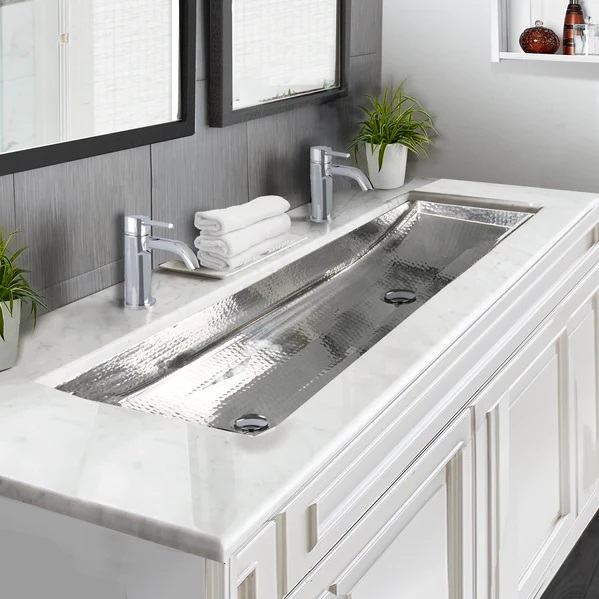
They Are 100% Recyclable
No other metal matches stainless steel recyclability. The material is 100% recyclable, making it the most recyclable metal in the world. At least 85% of all stainless steel used in the home and architecture market, where bathroom sinks fall, is recyclable. Unrecyclable stainless steel bits can be used as raw materials for making other products, so nothing goes to waste.
Goes to show that anyone keen on embracing a sustainable lifestyle should make stainless steel one of their materials of choice for many products. At the home front, we have various stainless steel sinks, options anyone can use to make this goal a reality. You can start at the bathroom—with sinks, vanity sinks, and faucets.
Miners Source Stainless Steel Raw Materials Responsibly
To create stainless steel, manufacturers use a combination of:
- Iron
- Carbon
- At least 10% chromium
- Nickel
- And several other elements.
All stainless steel components are mined responsibly and do not require excessive resources. For example, iron is the fourth most abundant element on the Earth’s crust, while nickel is the fifth. There is little risk of exhausting the two, but that does not mean all caution goes to the wind while sourcing these minerals.
Manufacturers use the same caution and care when sourcing less abundant components, such as chromium and carbon. Indeed, stainless steel manufacturers are bound by the sourcing and best practice guidelines set by regulatory bodies such as the International Chrome Development Institute.
The Mining Policy Framework by the Intergovernmental Forum on Mining (IGF) also outlines a comprehensive path towards sustainable development through efficient mining. Stainless sink manufacturers operating in IGF member states must follow the mining regulatory framework laid down to work towards IGF’s sustainable development objectives.
Mining Stainless Steel Compounds Does Not Produce Toxic Run-Off
None of the elements used to make stainless steel produce toxic mine drainage. Runoff from stainless steel production:
- Is not toxic
- Does not react with other elements to form dangerous compounds
- Does not dissolve toxic elements, causing them to seep into groundwater
- Does not harm plant or animal life
- Does not corrode items it comes into contact with.
Additionally, all stainless steel constituent metals have low toxicity and are not known to harm the environment.
They Do Not Require Surface Coating
Bathroom sinks and faucets made out of stainless steel do not require any surface coating. The steel is simply given a finish, usually satin, mirror luster, or brushing. But no product is added to create that final metallic look.
The problem with coatings is that they deteriorate over time. As they break down, they mix with the water running through the sink, polluting it. Some compounds in the coating may be toxic, causing harm to organisms that come in contact with the water. Using stainless steel sinks eliminates this risk.
They Are Durable
Many experts agree that stainless steel is among the most durable materials. The average stainless steel sink lasts between 15 and 30 years, a lifetime by industry standards. You can ward off rust and increase the lifespan by taking good care of the sink.
This longer lifespan means you’ll not replace the sink for a long time. Instead, you’ll have decades of worry-free use to enjoy your beautiful fixture. What pro-sustainability action could be better than this for a homeowner?
They Are Corrosion-Resistant
Chromium gives stainless steel bathroom sinks built-in corrosion resistance.
- Corrosion lowers the quality of life, as corroded material pollutes the air and seeps into water and soil, affecting plants, animals, and humans alike.
- Corroded metals destroy tools and equipment and shorten the lifespan of any product they touch. As a result, individuals, companies, and governments are forced to repair and replace affected products earlier than they should have.
- Beyond the high financial cost, this rust burden causes a fast depletion of natural resources as producers need more metals to make replacement products.
Final Thoughts
Replacing your bathroom sink materials with stainless steel is a practical and affordable way of supporting global sustainability efforts. The material has low toxicity and has little to no environmental harm. It also lasts long, meaning it consumes little natural resources.

Optimizing the efficiency of operations in a plumbing company is crucial for business success. Streamlining processes not only improves service delivery but also boosts profitability and customer satisfaction. Here are ten smart ways to enhance the operational efficiency of your plumbing business. Utilize Modern Technology The integration of modern technology in plumbing operations extends beyond Read more
Optimizing the efficiency of operations in a plumbing company is crucial for business success. Streamlining processes not only improves service delivery but also boosts profitability and customer satisfaction. Here are ten smart ways to enhance the operational efficiency of your plumbing business.

Utilize Modern Technology
The integration of modern technology in plumbing operations extends beyond basic administrative tasks. Today’s advanced plumbing tools, such as video inspection cameras and leak detection equipment, can significantly enhance diagnostic accuracy and job efficiency. In addition, software solutions can manage everything from customer appointments to real-time inventory tracking and employee dispatch. Cloud-based platforms offer the flexibility to access this data from anywhere, providing a critical advantage in responsiveness and decision-making. Embracing these technologies not only streamlines operations but also elevates the level of service offered to customers. By staying abreast of technological advancements, a plumbing business can differentiate itself in a competitive market and offer solutions that are both innovative and customer-centric.
Implement Efficient Scheduling and Dispatch Systems
Efficient scheduling and dispatch systems are more than just organizational tools; they are vital for optimizing the allocation of resources and ensuring customer satisfaction. Modern scheduling software often comes with features like GPS tracking, which helps in real-time monitoring of field personnel. This enables more dynamic scheduling, allowing dispatchers to respond to urgent calls more effectively or adjust schedules to accommodate unexpected delays. By reducing the time technicians spend on the road and ensuring prompt service, these systems can significantly enhance both operational efficiency and customer trust. The result is a more agile, responsive service that can adapt to the day’s demands in real-time.

Standardize Procedures and Best Practices
Standardizing procedures goes hand in hand with ensuring quality control in every aspect of the plumbing service. From the initial assessment of a job to the final quality check, standardized procedures ensure consistency and reliability in service delivery. This could include checklists for job completion or standardized customer follow-up protocols. By having a uniform approach, it becomes easier to train new employees and maintain high standards across the board. Furthermore, a standardized set of best practices helps in establishing a strong brand reputation, as customers begin to recognize and appreciate the consistent quality of service.
Invest in Training and Development
Regular training and development programs are pivotal for keeping the workforce up-to-date with the latest industry standards and technologies. These programs can cover a wide range of topics, from advanced plumbing techniques and new equipment training to soft skills like customer service and communication. Investing in your employees’ growth not only enhances their skills but also boosts morale and loyalty. A workforce that feels valued and equipped with the latest knowledge is more motivated and effective, directly contributing to the overall productivity and success of the business.
Optimize Inventory Management
Optimizing inventory management involves more than just keeping track of stock levels. It includes understanding the patterns of supply and demand, seasonal variations in the usage of certain parts, and even staying informed about new and more efficient materials or tools entering the market. An effective inventory system helps in minimizing capital tied up in stock while ensuring that essential items are always available. This balance is crucial for maintaining uninterrupted operations and the ability to respond quickly to customer needs. By streamlining inventory management, a plumbing business can reduce operational costs and improve its capacity to deliver prompt, reliable service.
Foster a Culture of Communication
Developing a culture of communication involves establishing clear channels for feedback and information sharing at all levels of the organization. It’s about creating an environment where employees feel comfortable sharing their insights and where customer feedback is actively sought and valued. This open dialogue can lead to significant improvements in processes, employee engagement, and customer satisfaction. Regular team meetings, open-door policies, and customer surveys can be effective tools in building this culture. In essence, fostering a culture of communication creates a more cohesive, informed, and responsive team.
Utilize Photo Badges for Employees
The use of photo ID badges for employees in a plumbing business serves multiple purposes. Beyond the basic function of identification and security, these badges can be integrated into various operational systems. For instance, they can be linked with job scheduling systems to track time spent on each job, enhancing accountability and aiding in payroll processing. They also project a professional image to customers, enhancing trust and credibility. In the age where security is paramount, showing a clear company ID can reassure customers, particularly when service calls require entering homes or private premises.
Prioritize Preventive Maintenance
Preventive maintenance extends beyond the tools and vehicles used in plumbing jobs; it also encompasses the digital assets of the business. Regular software updates, data backups, and security checks are essential to safeguard the business from technological failures or cyber threats. A comprehensive preventive maintenance plan ensures that all aspects of the business, from physical tools to digital infrastructure, are functioning optimally. This proactive approach can save substantial costs and downtime in the long run and ensures the business is always ready to serve its customers efficiently.
Encourage Feedback and Continual Improvement
Creating a system for continual feedback and improvement is about building a dynamic business model that adapts and grows. This system should encourage not just feedback but also creative problem-solving and innovation. Whether it’s a new approach to customer service, a suggestion for a more efficient workflow, or ideas for new services, employee and customer input can be invaluable. This culture of continual improvement keeps the business at the forefront of the industry, constantly evolving and improving in line with customer needs and market changes.
Monitor and Analyze Performance
Performance monitoring and analysis should encompass various aspects of the business – operational efficiency, customer satisfaction, financial performance, and employee engagement. Utilizing a comprehensive set of KPIs helps in getting a holistic view of the business’s performance. Regular analysis of these metrics allows for informed decision-making and strategic planning. It can identify areas where the business excels and areas that require improvement. By closely monitoring and analyzing performance, a plumbing business can make targeted changes that lead to substantial improvements in efficiency and service quality.
Conclusion
Streamlining the operations of your plumbing company requires a strategic approach, incorporating modern technology, efficient processes, and a focus on continuous improvement. By implementing these ten smart strategies, you can enhance the efficiency and productivity of your business. This not only leads to increased profitability but also strengthens your reputation in the market. In the competitive world of plumbing services, optimizing your operations is key to standing out and achieving long-term success.

Your plumbing business generates income through your services. It’s the simplest business model in the book; people pay for your plumbing services and you provide them. You can make a good living like this, but there are opportunities for more money to be made! There can be periods where you don’t get as much work Read more
Your plumbing business generates income through your services. It’s the simplest business model in the book; people pay for your plumbing services and you provide them. You can make a good living like this, but there are opportunities for more money to be made!
There can be periods where you don’t get as much work as you’d like, so it helps to have other possible sources of income feeding your earnings. Diversifying your plumbing business makes a lot of sense, and here are three of the best ways to do it:

Sell Plumbing Parts
Some people don’t like to pay for plumbers and prefer to tackle jobs themselves. That’s their decision, but you can find an easy way of catering to them. Get your hands on some plumbing parts or have some specially made. Sites like https://jdiplastics.com/ can introduce you to manufacturers capable of making things like plastic o-rings, caps for pipes, and so on.
Set up a website and sell these products alongside your services. It lets the DIY plumbers – and fellow professionals – purchase essential parts needed for maintenance or repair jobs. The other great thing about this is that you can offer to install the parts for someone, which helps you earn even more money with a service fee!
Create Plumbing Manuals
On the topic of selling products, why don’t you create plumbing manuals?
Look, you’ve got all the hallmarks of a great plumber. You’re the best at what you do, so share this knowledge with others. Think about some of the most common plumbing jobs around the house and create an e-book with step-by-step guides on how to do things like fixing a leaky faucet or stopping a toilet from running.
Sell the e-books for a small price on your website and you generate another stream of income. Alternatively, make books for plumbers to help them with their training!
Develop Great Content
If you don’t want to make an e-book, you can take your ideas and turn them into free content. You are literally reading a plumbing blog right now, full of free information for plumbers and regular people. If you start your own blog, you can draw people in with excellent content and make money from adverts, affiliate links, etc.
Or, do the same thing on YouTube and make video content – this is wonderful for showing people how to fix things! The additional benefit of developing content is that it works as a lead-generation tool. Your content draws in an audience and can convince them to hire your plumbing services or purchase any products you’re selling. This means more business and more money.
Try to avoid falling into the trap of relying on your plumbing services as the only source of income. When the demand for your services dries up, you need other ways of bringing home the bacon. Don’t be afraid to diversify and explore other ways of making money as a plumber.
